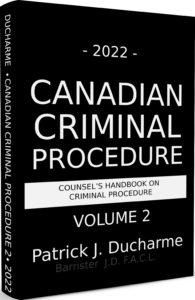 |
| Patrick Ducharme |
For purposes of challenging an order of committal for trial, it is necessary to know when the possibility of challenge has ended. For this reason a court is sometimes required to determine when the actual moment of preferment takes place. For the purposes of ending possible challenges and proceeding to trial in the Superior Court, our courts have interpreted preferment to take place when the indictment is lodged with the trial court and the trial is ready to proceed. The definition of when an indictment is “preferred” comes from R. v. Chabot1. The distinction is important because once an indictment has been preferred, any challenge to the proceedings, such as a motion to quash the order to stand trial made following a preliminary hearing, can no longer proceed.
The accused is also entitled to consent to adding charges to the indictment other than the charges referred to in subsections 574(1) and (1.1). The only limitation on this right is that the offences to be added to the indictment must be offences that were committed within the province in which the indictment is being preferred. Subsection 478(3) requires a specific process to be followed for charges transferred from one province to another. Except for this limitation, subsection 574(2) provides a means for an accused to bring a number of charges before one Judge for disposition by way of guilty plea.
This extraordinary power of a direct indictment placed in the hands of the Crown should only be exercised in exceptional circumstances.2 Section 784 provides for appeals from the granting or refusal to provide prerogative relief. Appeals are to the Court of Appeal . Leave to appeal to the Supreme Court of Canada must be obtained under section 40 of the Supreme Court Act.
An appeal lies to the Court of Appeal from a decision granting or refusing the relief sought in proceedings by way of mandamus, certiorari or prohibition. A writ of habeas corpus ad subjiciendum is treated differently than the other extraordinary writs. Where a writ of habeas corpus ad subjiciendum is refused by any Judge, no appeal from that decision is available to any party including the Attorney General, except in the limited circumstances outlined below pursuant to subsection 784(3).3 There is no appeal from a simple issuance of the writ.
Subsection 784(2) provides that except as provided in this section, Part XXI applies, with such modifications as the circumstances require, to appeals under this section. Subsection 784(5) of the Code provides a right to appeal in habeas corpus matters but does not create an interlocutory right to appeal in extradition cases where the accused has brought a habeas corpus application to attack his extradition proceedings in advance of the committal hearing.
Pursuant to subsection 784(3) where an application for a writ of habeas corpus ad subjiciendum is refused by a Judge of a court having jurisdiction, no application may again be made on the same grounds, whether to the same or to another court or Judge, unless fresh evidence is adduced, but an appeal from that refusal shall lie to the Court of Appeal, and where, on the appeal, the application is refused a further appeal shall lie to the Supreme Court of Canada, with leave of that Court.
Where a writ of habeas corpus ad subjiciendum is granted by any Judge, no further appeal shall lie at the instance of any party including the Attorney General of the Province concerned or the Attorney General of Canada.4
Where a judgment is issued on the return of a writ of habeas corpus ad subjiciendum, an appeal lies to the Court of Appeal, and, from a judgment of the Court of Appeal to the Supreme Court of Canada, with leave of that Court, at the instance of the applicant or the Attorney General of the Province concerned or the Attorney General of Canada, but not at the instance of any other party.5
An appeal in habeas corpus matters shall be heard by the court to which the appeal is directed at an early date, whether in or out of the prescribed sessions of the court.

The above is the an excerpt of Patrick J Ducharme's book, Canadian Criminal Procedure Volume 2, available at Amazon or in bulk through MedicaLegal Publishing along with Criminal Trial Strategies.
Subscribe to Patrick Ducharme's Youtube Channel
